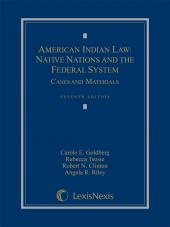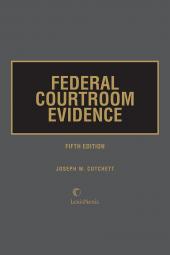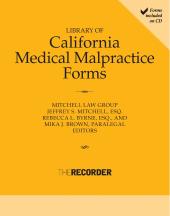American Indian Law: Native Nations and the Federal System
Select subscription type
Terms & conditions
Subscribers receive the product(s) listed on the Order Form and any Updates made available during the annual subscription period. Shipping and handling fees are not included in the annual price.
Subscribers are advised of the number of Updates that were made to the particular publication the prior year. The number of Updates may vary due to developments in the law and other publishing issues, but subscribers may use this as a rough estimate of future shipments. Subscribers may call Customer Support at 800-833-9844 for additional information.
Subscribers may cancel this subscription by: calling Customer Support at 800-833-9844; emailing customer.support@lexisnexis.com; or returning the invoice marked "CANCEL".
If subscribers cancel within 30 days after the product is ordered or received and return the product at their expense, then they will receive a full credit of the price for the annual subscription.
If subscribers cancel between 31 and 60 days after the invoice date and return the product at their expense, then they will receive a 5/6th credit of the price for the annual subscription. No credit will be given for cancellations more than 60 days after the invoice date. To receive any credit, subscriber must return all product(s) shipped during the year at their expense within the applicable cancellation period listed above.
Subscribers receive the product(s) listed on the Order Form and any Updates made available during the annual subscription period. Shipping and handling fees are not included in the annual price.
Subscribers are advised of the number of Updates that were made to the particular publication the prior year. The number of Updates may vary due to developments in the law and other publishing issues, but subscribers may use this as a rough estimate of future shipments. Subscribers may call Customer Support at 800-833-9844 for additional information.
Subscribers may cancel this subscription by: calling Customer Support at 800-833-9844; emailing customer.support@lexisnexis.com; or returning the invoice marked 'CANCEL'.
If subscribers cancel within 30 days after the product is ordered or received and return the product at their expense, then they will receive a full credit of the price for the annual subscription.
If subscribers cancel between 31 and 60 days after the invoice date and return the product at their expense, then they will receive a 5/6th credit of the price for the annual subscription. No credit will be given for cancellations more than 60 days after the invoice date. To receive any credit, subscriber must return all product(s) shipped during the year at their expense within the applicable cancellation period listed above.
Product description
To purchase a printed version of this title, please visit www.caplaw.com.
American Indian Law: Native Nations and the Federal System, now in its Seventh Edition, surveys the tribal-federal relationship. It is primarily devoted to the study of federal Indian law, i.e. the federal law developed to regulate the tribal-federal relationship. This book pursues a broad perspective, merging jurisprudence, history, comparative law, ethnology, and sociology to bring meaning to the tribal-federal relationship. The authors do not merely present the “black letter” law as is, but also provide the historical, cultural, and jurisprudential tools for a reader to critically analyze the current state of legal doctrine in federal Indian law. The book provides a wide-ranging inquiry into the role of law and legal processes, both domestic and international, in protecting or frustrating the desires for political and cultural autonomy of various racial, cultural, religious, or national subgroups within a society. epub is protected by Adobe DRM. eBooks, CDs, downloadable content, and software purchases are noncancelable, nonrefundable and nonreturnable. Click here for more information about LexisNexis eBooks. The eBook versions of this title may feature links to Lexis+® for further legal research options. A valid subscription to Lexis+® is required to access this content.
The authors have incorporated insights from an array of new intellectual developments in law and related fields, including critical race theory, the new legal realism of the law and society movement, empirical approaches to law, law and economics, indigenous methodology, legal pluralism, and neoinstitutionalism. The aim is to inform future practitioners and advocates about pragmatic, political possibilities and constraints, complementing theoretical and critical perspectives that may challenge the current state of affairs. At several points in the casebook the authors emphasize intergovernmental relations through cooperative agreements and institutional innovation. The cross-currents and inconsistencies of such legislative developments, case decisions, and intellectual ferment present formidable challenges to anyone who sets out in a casebook format to capture the depth and richness of the intellectual efforts of tribal people and others, including judges, legislators, lawyers, and academics, to build a coherent body of Indian law.
The book serves double-duty as a research sourcebook in the field of federal Indian law and can be used as a resource for students long after graduation.
Professors and adjunct professors may request complimentary examination copies of LexisNexis law school publications to consider for class adoption or recommendation. Please identify the book(s) you wish to receive, provide your institutional contact information, and submit your request here.
Table of contents
Chapter 1 HISTORIC AND MODERN CONCEPTIONS OF THE
TRIBAL-FEDERAL RELATIONSHIP
A. HISTORIC MODELS OF TRIBAL -FEDERAL RELATIONS
1. Introduction
2. Treaty Models of the Political Relationship Between Indian Tribes and
the Federal Government
a. International Self-Determination Model
Treaty of Fort Pitt with the Delaware Nation
b. Treaty Federalism Model
Treaty of Hopewell with the Cherokee Nation
Treaty of New Echota with the Cherokee Nation
c. Colonial Federalism Model
Treaty of Fort Sumner with the Navajo Nation
Notes on Models of Tribal-Federal Relations
B. HISTORY OF TRIBAL-FEDERAL RELATIONS
1. Introductory Perspectives
Cornplanter (Seneca), Speech Delivered to President George
Washington at Fort Stanwix, 1790
Tecumseh (Shawnee), Speech Delivered at Vincennes, Indiana,
August 12, 1810
2. The Uneven History of Federal Indian Policy: Politics, Assimilation,
and Autonomy
a. The Colonial Period (1492–1776)
b. The Confederation Period (1776–1789)
c. The Trade and Intercourse Act Era (1789–1835)
d. The Removal Period (1835–1861)
e. The Reservation Policy (1861–1887)
f. The Allotment Period and Forced Assimilation (1871–1934)
g. The Indian Reorganization Act Period (1934–1940)
h. The Termination Era (1940–1962)
i. The Self-Determination Era (1962–1980)
j. Government-to-Government Relations and Decreases in Federal
Indian Program Funding (1980–present)
k. History, Federal Indian Policy, and Statutory Interpretation
C. ORIGINS OF THE MODELS: FOUNDATIONAL UNITED STATES
SUPREME COURT DECISIONS AND THE TRIBAL RESPONSE
1. Property, Sovereignty, and Claims of Conquest: The Case of
Johnson v. M’Intosh
Speech of Corn Tassel (Cherokee at Hopewell Treaty
Negotiations)
Johnson v. M'Intosh
Notes on Johnson v. M'Intosh
2. Sovereignty Revisited: The Cherokee Cases
Cherokee Nation v. Georgia
Notes
Worcester v. Georgia
Notes
Note on the Rhetoric of Exclusion
D. PROCESSING MODELS OF TRIBAL-FEDERAL RELATIONS AS
LEGAL DOCTRINE: NINETEENTH AND EARLY TWENTIETH
CENTURY ILLUSTRATIONS
1. Treaties Between Nations
Ex parte Crow Dog
Notes
2. The Rise of Federal Plenary Power
United States v. Kagama
Notes on Kagama
United States v. Clapox
Notes
Lone Wolf v. Hitchcock
Notes on Lone Wolf
United States v. Sandoval
Notes on Sandoval
E. INTERNATIONAL HUMAN RIGHTS LAW AND INDIGENOUS
PEOPLES' RIGHTS
1. International Models of Political Self-Governance
Notes
2. The Institutional Framework for International Human Rights Law
Notes
Chapter 2 RECURRING ISSUES IN TRIBAL-FEDERAL
LEGAL RELATIONS
A. FUNDAMENTAL DEFINITIONAL QUESTIONS
1. What Is an Indian Tribe or Nation?
a. Tribal vs. Federal Definitions
b. Definitions of “Tribe” Under Federal Statutes
c. Achieving Federal Recognition
d. The Politics of Federal Recognition
Testimony of Kevin Gover, Professor of Law, Arizona State
University College of Law
2. Who Is an Indian?
a. Traditional Tribal Views of Status and Community Membership
b. Federal Definitions
P.S. Deloria & Robert Laurence, What's an Indian? A
Conversation About Law School Admissions, Indian Tribal
Sovereignty, and Affirmative Action
Notes on Defining Who Is An “Indian”
3. What Is the Extent of Tribal Territory, or Indian Country?
a. Indian Nations' Relationships to the Land
b. Defining “Indian Country”
i. Formal and Informal Reservations
United States v. John
Note
ii. Dependent Indian Communities
Alaska v. Native Village of Venetie
Notes on Venetie and “Dependent Indian Communities”
iii. Allotted Land Outside Reservations
iv. Determining the Boundaries of an Indian Reservation
Solem v. Bartlett
Notes on Determining Congressional Intent to Diminish
Boundaries
B. EQUAL PROTECTION QUESTIONS POSED BY INDIAN
LEGISLATION
1. Indian Classifications as Political Rather than Racial
Morton v. Mancari
Notes on Morton v. Mancari
United States v. Antelope
Notes on Treating Indian Classifications as Political Rather than
Racial
2. Indians as a Constitutional Racial Classification?
AFGE v. United States
Note on Indians as a Constitutional Racial Classification
3. When Might Equal Protection's “Strict Scrutiny” Invalidate Federal
Indian Legislation?
Babbitt v. Williams
Rice v. Cayetano
Notes on Treating Indians as a Suspect Racial Classification
C. CANONS OF CONSTRUCTION FOR INTERPRETING THE
TRIBAL-FEDERAL LEGAL RELATIONSHIP
Minnesota v. Mille Lacs Band of Chippewa Indians
San Manuel Indian Bingo and Casino v. N.L.R.B.
Notes on Indian Law Canons of Construction
Chapter 3 TRIBAL SOVEREIGNTY AND ITS EXERCISE
A. MODERN TRIBAL GOVERNMENTS
1. Tribal Constitutions and Courts
a. Emergence of Modern Written Tribal Constitutions
b. Types of Tribal Courts
2. Tribal Law Provisions on Jurisdiction
3. Sources of Law in Tribal Courts
Notes on Customary Law
4. Tribal Restrictions on Tribal Governments
a. Tribal Provisions for Federal Approval
B. TRIBAL GOVERNING AUTHORITY
1. Inherent Tribal Sovereignty
Talton v. Mayes
United States v. Wheeler
Notes
Merrion v. Jicarilla Apache Tribe
Notes on Nonmember Exclusion and Tribal Governing
Authority
2. Federally Supported Tribal Authority
United States v. Mazurie
Note on Varieties of Congressional Support for the Exercise of
Tribal Authority
Bugenig v. Hoopa Valley Tribe
Note on Bugenig
C. FEDERAL JUDICIAL AND LEGISLATIVE RESPONSES TO
INHERENT TRIBAL SOVEREIGNTY
1. Federal Judicial Plenary Power Purporting to Preempt Tribal
Sovereignty
Oliphant v. Suquamish Indian Tribe
Duro v. Reina
Notes
Montana v. United States
Notes
Strate v. A-1 Contractors
Notes
Nevada v. Hicks
Notes on Hicks
Plains Commerce Bank v. Long Family Land & Cattle Co., Inc.
Notes
Water Wheel Camp Recreational Area, Inc. v. LaRance
2. Congressional Acknowledgment of Inherent Tribal Sovereignty
United States v. Lara
Notes on Lara
3. Federal Conceptions of Tribal Taxing and Regulatory Power
Kerr-McGee v. Navajo Tribe
Atkinson Trading Company, Inc. v. Shirley
Notes on Tribal Taxing Jurisdiction
Brendale v. Confederated Tribes & Bands of the Yakima Indian
Nation
Notes on Tribal Regulatory Power
D. INDIVIDUAL RIGHTS AND TRIBAL AUTHORITY
1. Federal Restrictions on Tribal Governments: The Indian Civil
Rights Act of 1968
Santa Clara Pueblo v. Martinez
Notes
2. Individual Rights in Tribal Courts
Winnebago Tribe of Nebraska v. Bigfire
Notes
3. Tribal Power to Define Membership
Poodry v. Tonawanda Band of Seneca Indians
Notes on Tribal Membership/Citizenship and Banishment
E. INTERJURISDICTIONAL RESPECT AND COOPERATION
1. Extradition, Full Faith and Credit, and Comity
Eberhard v. Eberhard
Wilson v. Marchington
Notes on Full Faith and Credit and Comity
2. Intergovernmental Agreements
a. Why Enter into Intergovernmental Agreements?
National Congress of American Indians & National Conference
of State Legislatures, Government to Government: Models
of Cooperation Between States and Tribes
Notes on Tribal-State Intergovernmental Agreements
b. Authority to Enter into Tribal-State Agreements
c. Enforcement Issues
F. TRIBAL SOVEREIGN IMMUNITY
1. In Federal and State Courts
Oklahoma Tax Commission v. Citizen Band Potawatomi Indian
Tribe of Oklahoma
Kiowa Tribe of Oklahoma v. Manufacturing Technologies, Inc.
Michigan v. Bay Mills Indian Community
Notes on Tribal Sovereign Immunity in Federal and State
Courts
C & L Enterprises, Inc. v. Citizen Band Potawatomi Indian
Tribe of Oklahoma
Notes on Waiver of Tribal Sovereign Immunity
2. Scope of Sovereign Immunity in Tribal Courts
Charbonneau v. St. Paul Insurance Company
Chapter 4 FEDERAL AND STATE AUTHORITY IN INDIAN
COUNTRY
A. THE FEDERAL GOVERNMENT'S PLENARY POWER OVER
INDIANS AND INDIAN COUNTRY
1. Sources and Scope of the Power
United States v. John
Notes
Delaware Tribal Business Committee v. Weeks
Notes on the Bill of Rights and Plenary Power
2. Non-Constitutional Limitations on Legislative Plenary Power:
Canons of Construction, Treaty Abrogation, and Political
Accountability
United States v. Dion
Notes on Treaty Abrogation
3. Criminal Jurisdiction as an Illustration of the Exercise of Federal
Power over Indian Affairs
a. Introduction
b. Federal Criminal Jurisdiction Statutes
Note on Juvenile Offenders and Federal Jurisdiction
c. Implications of Federal Criminal Jurisdiction Statutes for Tribal
Jurisdiction
Wetsit v. Stafne
Notes on Concurrent Tribal Jurisdiction over “Major”
Crimes and Double Jeopardy
Walker v. Rushing
Notes on Concurrent Tribal Criminal Jurisdiction Under Public
Law 280 and Like Statutes
d. Criminal Jurisdiction, Policing, and Extradition
e. Problems
4. Federal Civil Jurisdiction
a. Federal Jurisdiction to Tax and Regulate
Squire v. Capoeman
Lazore v. Commissioner of Internal Revenue
Notes on Federal Taxation of Tribes and Tribal Members
b. Federal Civil Adjudicative Jurisdiction
County of Oneida v. Oneida Indian Nation
National Farmers Union Insurance Cos. v. Crow Tribe
Iowa Mutual Insurance Co. v. LaPlante
Notes on Federal Civil Jurisdiction Involving Indian Country
5. Federal Executive Power and the Executive Trust Responsibility
a. The Bureau of Indian Affairs and the Administration of Federal
Indian Programs
United States v. Eberhardt
Notes on Statutory Authority for Administrative Action
b. The Trust Relationship
United States v. Mitchell
Notes on Trust Mismanagement Claims
United States v. White Mountain Apache Tribe
United States v. Navajo Nation
Note on Recent Mismanagement Claims
Cobell v. Norton
Note on Further Developments in the Cobell Litigation
Cobell v. Salazar
Note on Settlement of the Cobell Litigation
c. Conflicts of Interest Between Government Departments and the
Prospect of Equitable Relief
United States v. Jicarilla Apache Nation
Nevada v. United States
Notes on Injunctive Enforcement of the Trust
6. Federal Power in the Era of Self-Determination
Salazar v. Ramah Navajo Chapter
Note on Federal Programs and Administrative Authority of
Federal Agencies for Tribal Services
B. STATE AUTHORITY IN INDIAN COUNTRY
1. Tribal Expectations
Cherokee Council, 1830
George W. Harkins (Choctaw), Farewell Letter to the American
People, 1832
Treaty with the Creek and Seminole Tribes
Note on Tribal Expectations Regarding State Authority
2. Early Approaches to Inherent State Power in Indian Country
Notes
3. Congressionally Authorized State Power in Indian Country
4. The Modern Era
a. State Adjudicative Jurisdiction
Williams v. Lee
Notes
Joe v. Marcum
Note on Enforcement of Judgments in Indian Country
Teague v. Bad River Band of Lake Superior Tribe of
Chippewa Indians
Notes
b. State Taxing and Regulatory
McClanahan v. Arizona State Tax Commission
Washington v. Confederated Tribes of the Colville
Reservation
Notes
White Mountain Apache Tribe v. Bracker
Cotton Petroleum Corp. v. New Mexico
Notes on State Taxing Jurisdiction
New Mexico v. Mescalero Apache Tribe
California v. Cabazon Band of Mission Indians
Notes on State Jurisdiction to Regulate
5. State Jurisdiction over Indians and Indian Property Outside Indian
Country
Mescalero Apache Tribe v. Jones
Notes
Oklahoma Tax Commission v. Chickasaw Nation
Note
Chapter 5 JURISDICTION UNDER SPECIAL STATUTES
A. PUBLIC LAW 280 AND RELATED STATUTES
1. Text and History
Carole E. Goldberg, Public Law 280: The Limits of State
Jurisdiction over Reservation Indians
2. Acquiring and Exercising State Jurisdiction Under Public Law 280
Bryan v. Itasca County
Notes
3. Concurrent Tribal and State Jurisdiction Under Public Law 280
Notes
4. Practical Effects and the Future of Public Law 280
Note on the Future of Public Law 280
B. UNIQUE TRIBAL-FEDERAL RELATIONSHIPS
1. Alaska
a. The Alaska Native Claims Settlement Act of 1971 (ANCSA)
Notes on the Alaska Native Claims Settlement Act
b. Indian Country and Tribal Government Jurisdiction
Note
2. Hawai'i
a. The Hawaiian Homes Commission Act of 1921
b. The Hawai'i State Constitution and the 1982 Amendments
c. Ceded Lands Controversy
Hawaii v. Office of Hawaiian Affairs
d. Native Hawaiian Political Status and Legal Rights
Notes on Native Hawaiian Sovereignty
C. INDIAN CHILD WELFARE ACT
1. Introduction
2. Jurisdiction and “Domicile” Under ICWA
Mississippi Band of Choctaw Indians v. Holyfield
Notes
3. “Indian Child” Under ICWA
In re A.J.S.
Notes
4. When Does ICWA Protect an Indian Parent?
Adoptive Couple v. Baby Girl
Notes
5. “Good Cause” and Transfer of ICWA Cases from State to Tribal
Court
Bureau of Indian Affairs Guidelines for State Court Indian
Child Custody Proceedings
Notes on Transfer of Cases from State to Tribal Court
6. ICWA and the Adoption and Safe Families Act
D. INDIAN GAMING REGULATORY ACT
1. The Jurisdictional Regime for Tribal Gaming
Kevin K. Washburn, Recurring Problems in Indian Gaming
Alex Tallchief Skibine, The Indian Gaming Regulatory Act at
25: Successes, Shortcomings, and Dilemmas
Rumsey Indian Rancheria of Wintun Indians v. Wilson
Seminole Tribe of Florida v. Florida
Pueblo of Santa Ana v. Kelly
Notes
2. Business Disputes Related to Gaming
Bruce H. Lien Company v. Three Affiliated Tribes
Notes on Tribal Gaming Disputes
E. FEDERAL INDIAN LIQUOR CONTROL STATUTES
Rice v. Rehner
Notes on Federal Indian Liquor Control Laws
F. FEDERAL ENVIRONMENTAL LAWS
1. Introduction: Tribal Perspectives on Economic Development and
the Environment
John Echohawk, We Are Sovereign Peoples
2. The Basic Framework of Federal Environmental Law and Policy
a. EPA's Indian Policy
EPA POLICY FOR THE ADMINISTRATION OF ENVIRONMENTAL
PROGRAMS ON INDIAN RESERVATIONS
b. Implications for Application of State Environmental Laws
Washington Department of Ecology v. EPA
Notes
3. Federal Laws Regulating Tribal Activities
a. Environmental Review Requirements
Davis v. Morton
Notes on Federal Environmental Review Requirements
b. The Endangered Species Act in Indian Country
Secretarial Order #3206
Notes on Tribes and the Endangered Species Act
4. Federal Protection for Tribal Environments and Economic Activities
from Non-Indian Economic Development
Wisconsin v. Environmental Protection Agency
Notes on Tribal Environmental Controls Affecting
Off-Reservation Development
Chapter 6 TRIBAL RIGHTS TO LAND AND CULTURAL
RESOURCES
A. TRIBAL PROPERTY INTERESTS
1. Aboriginal Title
United States ex rel. Hualpai Indians v. Santa Fe Pacific
Railroad Co
Notes on Aboriginal Title
Tee-Hit-Ton Indians v. United States
Nell Jessup Newton, At the Whim of the Sovereign: Aboriginal
Title Reconsidered
Notes
2. Recognized Title
United States v. Shoshone Tribe of Indians
United States v. Sioux Nation
Notes on Recognized Title
3. Executive Order Reservations
Sioux Tribe v. United States
Notes
4. Placing Indian Land in Trust
Carcieri v. Salazar
Notes on Land-into-Trust and Carcieri
Match-E-Be-Nash-She-Wish Band of Pottawatomi
Indians v. Patchak
Notes
5. Land Claims
a. The Indian Claims Commission
United States v. Dann
Notes on the Dann Case and the Indian Claims
Commission
b. Claims Under the Nonintercourse Act
County of Oneida v. Oneida Indian Nation
City of Sherrill, N.Y. v. Oneida Indian Nation of New York
Notes on the Oneida Litigation and the Nonintercourse Act
6. Allotted Lands
Northern Cheyenne Tribe v. Hollowbreast
Black Hills Institute of Geological Research v. South Dakota
School of Mines and Technology
Notes on Allotted Lands
Hodel v. Irving
Babbitt v. Youpee
Notes on Fractionated Allotments
B. CULTURAL RESOURCES
1. Sacred Sites and Religious Freedom
Lyng v. Northwest Indian Cemetery Protective Association
Note on Lyng
Employment Division, Department of Human Resources of
Oregon v. Smith
Notes
2. Cultural Property
a. Tangible Cultural Property
Chilkat Indian Village v. Johnson
Chilkat Indian Village, IRA v. Johnson
United States v. Corrow
Notes on Tangible Cultural Property
b. Intangible Cultural Property
Rebecca Tsosie, Reclaiming Native Stories: An Essay on
Cultural Appropriation and Cultural Rights
Notes
3. Protections for Native American Human Remains
a. Exhumation of Human Remains
Charrier v. Bell
Notes
b. “Repatriation” and “Ownership” of Human Remains Under
NAGPRA
Bonnichsen v. United States
Notes
Chapter 7 THE OPERATION OF THE RESERVED RIGHTS
DOCTRINE: HUNTING, FISHING, AND
WATER RIGHTS
A. HUNTING, FISHING, AND FOOD-GATHERING RIGHTS
Aleck Paul (Chippewa), Our Stock of Food & Clothes
1. On-Reservation Rights
Menominee Tribe v. United States
Notes on On-Reservation Hunting and Fishing Rights
2. Off-Reservation Food-Gathering Rights
United States v. Winans
Notes on Winans and its Aftermath
Washington v. Washington State Commercial Passenger Fishing
Vessel Association
Notes on Off-Reservation Food Gathering Rights
B. COMPETITION FOR CONTROL OF WATER
1. Source, Quantity, and Use of Indian Water Rights
Winters v. United States
Arizona v. California
Notes on Winters Rights
In Re General Adjudication of All Rights to Use Water in Gila
River System and Source
Notes on Winters Rights Quantification
2. Adjudicating and Regulating Indian Water Rights
Arizona v. San Carlos Apache Tribe
Notes on State Adjudication of Indian Water Rights
3. Water Rights of Allottees and Their Successors
4. Water Rights Settlements as Alternatives to Litigation
Robert T. Anderson, Indian Water Rights: Litigation and
Settlements
Notes on Indian Water Settlements
Table of Cases
Index
 Lexis Nexis
Lexis Nexis 



